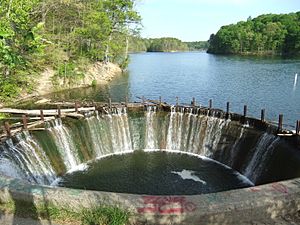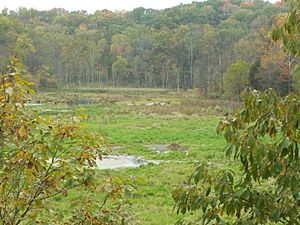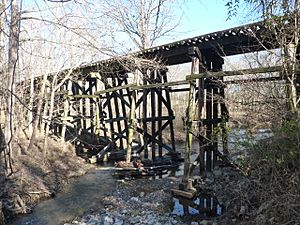Monroe County, Indiana facts for kids
Quick facts for kids
Monroe County
|
||
|---|---|---|

Monroe County courthouse in Bloomington, Indiana
|
||
|
||
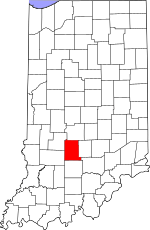
Location within the U.S. state of Indiana
|
||
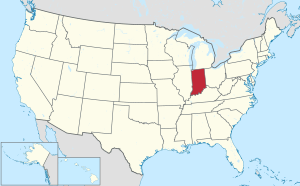 Indiana's location within the U.S. |
||
| Country | ||
| State | ||
| Founded | January 14, 1818 | |
| Named for | James Monroe | |
| Seat | Bloomington | |
| Largest city | Bloomington | |
| Area | ||
| • Total | 411.32 sq mi (1,065.3 km2) | |
| • Land | 394.51 sq mi (1,021.8 km2) | |
| • Water | 16.81 sq mi (43.5 km2) 4.09%% | |
| Population
(2020)
|
||
| • Total | 139,718 | |
| • Estimate
(2023)
|
139,342 |
|
| • Density | 339.682/sq mi (131.1520/km2) | |
| Time zone | UTC−5 (Eastern) | |
| • Summer (DST) | UTC−4 (EDT) | |
| Congressional district | 9th | |
| Indiana county number 53 | ||
Monroe County is a county in the U.S. state of Indiana. In 1910 the US Census Bureau calculated the nation's mean population center to lie in Monroe County. The population was 139,718 at the 2020 United States Census. The county seat is Bloomington. Monroe County is part of the Bloomington, Indiana, Metropolitan Statistical Area.
Contents
History
Monroe County was formed in 1818 from portions of Orange County. It was named for James Monroe, fifth President of the United States, who was in that office from 1817 until 1825.
Demographics
| Historical population | |||
|---|---|---|---|
| Census | Pop. | %± | |
| 1820 | 2,679 | — | |
| 1830 | 6,577 | 145.5% | |
| 1840 | 10,143 | 54.2% | |
| 1850 | 11,286 | 11.3% | |
| 1860 | 12,847 | 13.8% | |
| 1870 | 14,168 | 10.3% | |
| 1880 | 15,875 | 12.0% | |
| 1890 | 17,673 | 11.3% | |
| 1900 | 20,873 | 18.1% | |
| 1910 | 23,426 | 12.2% | |
| 1920 | 24,519 | 4.7% | |
| 1930 | 35,974 | 46.7% | |
| 1940 | 36,534 | 1.6% | |
| 1950 | 50,080 | 37.1% | |
| 1960 | 59,225 | 18.3% | |
| 1970 | 84,849 | 43.3% | |
| 1980 | 98,785 | 16.4% | |
| 1990 | 108,978 | 10.3% | |
| 2000 | 120,563 | 10.6% | |
| 2010 | 137,974 | 14.4% | |
| 2020 | 139,718 | 1.3% | |
| 2023 (est.) | 139,342 | 1.0% | |
| US Decennial Census 1790–1960 1900–1990 1990–2000 2010 |
|||
As of the 2020 United States Census, there were 139,718 people and 56,399 households with an average of 2.34 persons per household in the county. The population density was 354.1 inhabitants per square mile (136.7/km2). As of July 1, 2021, there were 64,362 housing units of which 55.2% were owner-occupied. The racial makeup of the county was 86.0% white, 6.9% Asian, 3.9% black or African American, 0.3% American Indian, 0.1% Native Hawaiian and Other Pacific Islander, and 2.8% from two or more races. Those of Hispanic or Latino origin made up 3.8% of the population.
According to the American Community Survey, as of 2021, there were 56,714 households with the average household size of 2.18 persons. Out of those 27,340 households were families with the average family size of 2.87 persons, 22.1% had children under the age of 18 living with them. A total of 37.3% of all households were householders living alone.
The median income for a household in the county was $51,945 (in 2021 USD) and the per capita income was $30,609. Males had a median income of $52,263 versus $47,953 for females.
About 10.6% of families and 22.8% of the population were below the poverty line, including 14.7% of those under age 18 and 6.2% of those age 65 or over.
Geography
According to the 2010 census, the county has a total area of 411.32 square miles (1,065.3 km2), of which 394.51 square miles (1,021.8 km2) (or 95.91%) is land and 16.81 square miles (43.5 km2) (or 4.09%) is water. The county terrain is low rolling hills, covered with vegetation and largely devoted to agricultural use or urban development. The eastern part is carved with drainages and gullies, leading to Griffy Lake. The county's highest point is McGuire Benchmark, just NW of Bloomington, at 994 ft (303 m) ASL.
Adjacent counties
Bodies of water
Monroe County is divided between the basins of the East Fork and West Fork of Indiana's White River. The northern part drains to the West Fork; the southern part of the county drains to the East Fork, primarily via the Salt Creek and its tributaries, such as the Clear Creek (known as the "Jordan River" on Indiana University Bloomington campus).
Several artificial reservoirs have been constructed by damming the county's creeks. The largest is Monroe Lake, a large reservoir on Salt Creek in the southeastern part of the county. It is used both for recreational purposes and to supply the city with drinking water. Until the late 1960s, the main source of water supply was the smaller Lake Lemon (constructed 1953), in the northeastern part of the county; it is now the backup water source and is mainly used for recreation.
The third largest is Griffy Lake, on the northern slope of the county. Constructed in 1924 by damming Griffy Creek, it was Bloomington's main water source until 1954; it is now used primarily for recreation although it also serves as an emergency water source. In 2012–2013, the lake was drained, the dam repaired, and the lake was refilled.
A smaller lake, Weimer (Wapehani) in the Clear Creek basin, was constructed for water supply purposes, but during most of its history was used purely for recreation - mainly fishing. In 2017 authorities revealed plans to drain this lake permanently, as it was considered to be unsafe. This was carried out in the summer of 2018.
Limestone has been quarried in Monroe County since 1826. A number of abandoned limestone quarries in the county are now cliff-surrounded lakes (as seen in the 1979 film Breaking Away), stable without ongoing human intervention.
National protected areas
- Hoosier National Forest (part)
Natural wonders
- Buckner Cave
- Leonard Springs Nature Park, where the water of Sinking Creek reappears in springs
Communities
Cities
Towns
Census-designated places
Unincorporated communities
- Arlington
- Broadview
- Buenavista
- Cascade
- Chapel Hill
- Clear Creek
- Dolan
- Eastern Heights
- Elwren
- Fairfax
- Fleener
- Forest Park Heights
- Garden Acres
- Handy
- Highland Village
- Hindustan
- Hoosier Acres
- Kirby
- Kirksville
- Knight Ridge
- Lancaster Park
- Leonard Springs
- Marlin Hills
- Modesto
- Mount Tabor
- New Unionville
- Ridgemede
- Sanders
- Smithville
- Stanford
- Sunny Slopes
- Unionville
- Van Buren Park
- Victor
- Wayport
- West Brook Downs
- Woodbridge
- Woodville Hills
- Yellowstone
Former communities
- Paynetown at 39°04′30″N 86°25′47″W / 39.0749°N 86.4296°W - flooded by Lake Monroe
Townships
- Bean Blossom
- Benton
- Bloomington
- Clear Creek
- Indian Creek
- Perry
- Polk
- Richland
- Salt Creek
- Van Buren
- Washington
Climate and weather
| Weather chart for Bloomington, Indiana | |||||||||||||||||||||||||||||||||||||||||||||||
|---|---|---|---|---|---|---|---|---|---|---|---|---|---|---|---|---|---|---|---|---|---|---|---|---|---|---|---|---|---|---|---|---|---|---|---|---|---|---|---|---|---|---|---|---|---|---|---|
| J | F | M | A | M | J | J | A | S | O | N | D | ||||||||||||||||||||||||||||||||||||
|
2.7
36
19
|
2.7
42
23
|
3.7
52
32
|
4.3
64
41
|
5.1
74
52
|
4.1
82
61
|
4.3
86
65
|
4
84
62
|
3.6
78
55
|
3.1
67
44
|
4
54
35
|
3.4
41
24
|
||||||||||||||||||||||||||||||||||||
| temperatures in °F precipitation totals in inches source: The Weather Channel |
|||||||||||||||||||||||||||||||||||||||||||||||
|
Metric conversion
|
|||||||||||||||||||||||||||||||||||||||||||||||
In recent years, average temperatures in Bloomington have ranged from a low of 19 °F (−7 °C) in January to a high of 86 °F (30 °C) in July, although a record low of −21 °F (−29 °C) was recorded in January 1985 and a record high of 110 °F (43 °C) was recorded in July 1936. Average monthly precipitation ranged from 2.66 inches (68 mm) in January to 5.12 inches (130 mm) in May.
Education
Monroe County Public Library operates branches at Bloomington and Ellettsville.
Monroe County is home to Indiana University Bloomington.
Transportation
Major highways
 I-69
I-69 Indiana State Road 37
Indiana State Road 37 Indiana State Road 45
Indiana State Road 45 Indiana State Road 46
Indiana State Road 46 Indiana State Road 48
Indiana State Road 48 Indiana State Road 446
Indiana State Road 446
For many years Monroe County was one of the most populous counties in the USA which did not contain any US highways or Interstate highways. However, in December 2015 the I-69 extension was completed into the county and this distinction disappeared. The highway was further extended north into Morgan County in 2018.
Railways
Although Monroe County has a rich railway history, currently its only railway is the Indiana Rail Road, whose mainline crosses the county from the north-east to the south-west, with branches to a few industrial facilities. There is no passenger service.
Between 1854 and 2004, an important north–south line connecting the Ohio River with Lake Michigan crossed Monroe County as well, serving Stinesville, Elletsville, Bloomington, Smithville, and Harrodsburg. It was operated by the Monon Railroad throughout much of the 20th century, and later by CSX. The last passenger service operating on this line was Amtrak's Floridian Chicago-Miami service, during 1972–1979. With the termination of this service in 1979, Monroe County lost passenger railway service. CSX continued to use this line for freight for another quarter of a century, but in 2004, it stopped using this line. Large parts of it have since been converted to trails.
Air transport
- Monroe County Airport, southwest of Bloomington. Scheduled passenger service to this airport was terminated ca. 1997, and since then the airport has been used by general aviation only.
See also
 In Spanish: Condado de Monroe (Indiana) para niños
In Spanish: Condado de Monroe (Indiana) para niños



